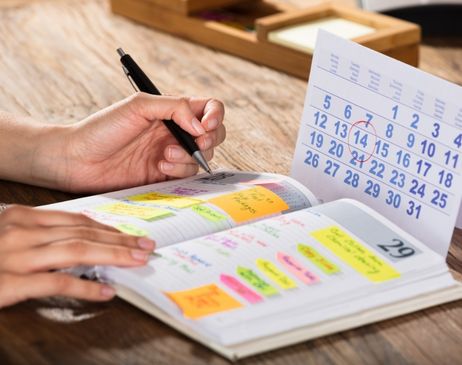How to Stop Stress Eating
EAT BETTER
How to Stop Stress Eating

Stress, anxiety and depression affects most of us in one way or another. In fact, 74% of adults in the UK have experienced moments of extreme stress this year1. We all deal with it in slightly different ways. Some are positive, others less so.
One very common reaction to low mood is known as ‘stress eating’ or ‘emotional eating’. Those that stress eat find themselves overeating and/or eating unheathily as a coping mechanism. This is less than ideal as not only will it derail any weight loss plans you have, it’s also not good for your physical health and can even worsen your mental health2.
There are techniques out there which can help you stop turning to stress eating for comfort when you’re struggling. It’s time to stop ‘eating your feelings’ and make food consumption part of a healthy lifestyle.

Why do I overeat when I’m stressed?
There are both emotional and physical reasons you may overeat when stressed. Firstly, high cortisol levels3 associated with increased stress have the potential to increase appetite and drive food cravings–particularly for sugary or fatty foods. Stress has also been shown to increase hunger hormones that play a part in how we manage our diet and the foods we want to eat.
Emotional factors also play a large part in the question of why you overeat when you’re stressed, and it’s important to recognise the difference. Ask yourself the following questions to determine whether its emotional or physical hunger that you’re experiencing:
- Are feelings of hunger fast or slow to arrive?
- Are you craving a specific food?
- Are you experiencing “mindless” eating?
- Can you identify whether hunger comes from the stomach or the head?
- Do you feel regret or guilt after eating?
Asking yourself these stress eating questions can help you distinguish between physical vs emotional hunger. When you are able to do this, you are more likely to limit your eating when stressed, allowing you to better manage portions and reduce snacking in between meals.

How to stop stress eating and lose weight
Learning how to stop stress eating helps you break a vicious cycle of eating unhealthily. Not only will you have greater control of your eating habits, but you’ll also discover that eating healthy can reduce stress and stop you from overeating in the first place! Begin by implementing some of the following ideas into your daily routine.
Be aware
Stress eating is at its most dangerous when it creeps into your behaviour without you noticing. If you try to pay attention to your cravings and food habits wherever possible, you should spot the early signs.
Not only can you nip any unhealthy snacking or bingeing in the bud, you’ll also identify that your mood is about to suffer and can make other changes or preparations accordingly.
Manage temptation
Of course, it’s not possible to fully eradicate the possibility of a bout of stress eating. After all, we’re all just a phone call or tap on an app away from a delivery on our doorstep. However, keeping quick tempters such as biscuits, crisps or sweets out of sight can help.
You needn’t throw sweet (or savoury) treats away or feel you have to bury them at the bottom of the garden. Just keep them out of your day-to-day eyesight.
 Keep a food diary
Keep a food diary
If you’re not convinced that your eating habits track with your mood, try keeping a record of both. It doesn’t have to be a heartfelt diary of your every emotion, but try to score your mood with a rating system perhaps. Note it next to what you eat and you may well spot some links.
Once you have your eating habits in black and white, you can start to establish patterns and come up with targets and goals that may help you to understand how to stop stress eating in the future.
Try to control your mood
We’d all like to be able to tame the feelings of anxiety and stress that we can all feel. It is, of course, much easier said than done. That said, there are still lots of methods which may just prove effective for you.
Yoga, mindfulness, breathing techniques – they’re all pretty well known. Some may work for you, others may not. Discover a stress management technique that can calm you though and it’s likely to have a positive effect on your likelihood to lapse into emotional stress eating.
Replace the urge to eat with something else
The next time the urge to snack unheathily occurs to you – and you know it’s stress related – stop for a second. Recognise and accept the feeling. Then look to answer the urge with an alternative that allows you to eat healthy and reduce stress.
Often, we confuse thirst with hunger4. Try drinking a glass of water. Perhaps a quick walk around the block may satisfy your desire to ‘do’ something. Or it may be much more mood-based. You may be subconsciously a little concerned about something. Try calling, seeing, or even just messaging a friend or family member. It could relax you.
 Don’t be afraid to seek help and support
Don’t be afraid to seek help and support
A good support network of trusted people that you’re close with can really help. Be open and honest with them about your stress eating – how it manifests and what triggers it and they’ll understand and offer assistance. It may just be a friendly ear, but something as simple as that can be enormously helpful.
Research has shown that people under stress tend to cope better with their mental health when they have people they can turn to5.
Swap unhealthy snacks with healthy ones
If you’re finding stress eating difficult to cut out completely, you can mitigate its effect on your weight and health by swapping out empty calorie options with nutritious, protein-rich snacks.
A handful of nuts can replace a packet of crisps. So can a snack-sized portion of vegetable crudités and hummus or some popcorn (without butter or salt). There are lots of healthy options out there.
You can get creative too. If you’re craving a pizza, try making your own low-fat version with pitta bread or a tortilla as a base.
 Break into a sweat
Break into a sweat
If you’re in a heightened mood, exercise can help relax you6. That’s just one of the many positive impacts on the body and mind that the endorphins released by the brain during exercise can have.
Not only that, but working out is generally good for you and tends to leave us feeling positive and good about ourselves7. Don’t exercise on an empty stomach, though. Eat something high in protein beforehand. Yoghurt, nuts, seeds, grilled chicken, that kind of thing.
Do be aware that stress eating is not to be confused with an eating disorder. If your eating behaviour becomes particularly concerning, please contact a medical professional or specialist.
Stay tuned to the XLS blog for more tips and advice on how to reach your weight loss goals and lose weight healthily.
 Keep a food diary
Keep a food diary Don’t be afraid to seek help and support
Don’t be afraid to seek help and support Break into a sweat
Break into a sweat